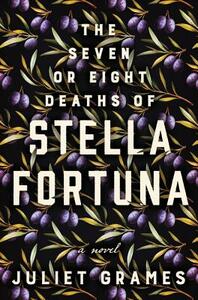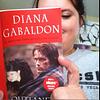Take a photo of a barcode or cover
I received this ARC in exchange for my honest, unbiased opinion from the publisher.
I enjoyed this historical fiction/magical realism story of Stella Fortuna, a woman from a traditional Italian family that immigrates from their small village to the US during WWII. The story is structured in multiple phases of life (birth, maturity, etc) to show the plot’s progression and that was helpful to the reader, but sections could be trimmed a little bit to make them less dense or to help us realize how Stella dies in each phase of life. In addition, the family roles were a bit stereotypical while reading (abusive father, baby-making machine mother, etc) but then we’re clarified at the end with an author’s note. I am not sure if I’d prefer for this note to be moved up to the beginning of the novel, but let it be so.
The additional thematic topics of immigration, rape culture and women roles are great topics for conversations as well! But with so many characters in the novel (again, stereotypical large Italian family), you start to lose track of their respective timelines.
Pick up if you enjoy “The Age of Adeline” or Mario Puzo’s “The Godfather”.
I enjoyed this historical fiction/magical realism story of Stella Fortuna, a woman from a traditional Italian family that immigrates from their small village to the US during WWII. The story is structured in multiple phases of life (birth, maturity, etc) to show the plot’s progression and that was helpful to the reader, but sections could be trimmed a little bit to make them less dense or to help us realize how Stella dies in each phase of life. In addition, the family roles were a bit stereotypical while reading (abusive father, baby-making machine mother, etc) but then we’re clarified at the end with an author’s note. I am not sure if I’d prefer for this note to be moved up to the beginning of the novel, but let it be so.
The additional thematic topics of immigration, rape culture and women roles are great topics for conversations as well! But with so many characters in the novel (again, stereotypical large Italian family), you start to lose track of their respective timelines.
Pick up if you enjoy “The Age of Adeline” or Mario Puzo’s “The Godfather”.
dark
sad
medium-paced
Couldn’t decide between giving this three or four stars. My interest was captured at the beginning between wanting to know about the various deaths of Stella and what caused her to turn on her sister after the accident, but at the end of the book I was left feeling a bit disappointed and not particularly liking any of the characters. I enjoyed the perspective of growing up in a small village in southern Italy and the journey of immigration to America. The book also really makes you think about what being a female has meant for probably a majority of women throughout history— obedience to husbands and fathers, marriage and motherhood whether you wanted it or not. However, I didn’t end up feeling particularly convinced of why Stella would end up hating Tina. While Tina was not my favorite character, I don’t think it would really be fair to blame her for any of the things that happened to Stella. Also, while I felt bad for Stella, I wasn’t really convinced of why she would become an alcoholic or seem to be so uncaring about her children when she had seemed to warm to the idea of motherhood once becoming pregnant. Don’t get me wrong, spending all that time pregnant and trying to control 10 children after never wanting any of that in the first place would be awful. But she also had a husband who worked three jobs and did all the cooking, plus the help of her sister and mother in raising her children. I think the author could have made me feel more in touch with the character and her depression by having her forced to become the cook for her family and taken away from her mother prematurely rather than when she died. Also, while it was clear that Stella did not want marriage or children, it wasn’t really clear what she did want. If she had a more concrete dream for an alternative life that again would have helped me feel more sympathetic to her character. To be fair I think she enjoyed working and she did have her idea of running away but while she would have been happy to be away from her father would she really have been okay being away from her mother at that point when it sent her spiraling all those years later? I know this wasn’t what the author was going for but I feel like it would’ve been a more satisfying conclusion to have had Tina really be more culpable in many of the near-deaths and things that went wrong in Stella‘s life. Perhaps following her lobotomy Stella would have realized that rather than the hand of a ghost it was Tina‘s hand causing her to be her various accidents. Along with that it would have been quite satisfying to have it be timid Tina who killed her father in the end after realizing what a horrible man he was when Stella told her about what she had found him doing with his nieces. If this would have been the case I would have both understood Stella‘s new hatred for her sister while also somehow being more sympathetic toward Tina in the end.
Though I really enjoyed this book in many ways I also was very frustrated by it.
The beginning which focuses on Stella’s childhood and her family history in Italy was by far my favorite part of the book.
Then the next part is young adult life in America - this section of the book could have been edited down a bit - it was drawn out too much for me especially considering she ends up with the exact fate she wanted to badly to avoid - I felt like I was reading the slow death of someone - no joy left for her just getting on - her life makes no forward progress other than that of time and deterioration- in some ways this was maybe an honest view of someone’s life at that time but for a book it was just frustrating - it was like the character gave up and we had to just watch. Like her relationship with Carmelo - it doesn’t improve or deteriorate it just is for like 50 years. She has not character development after getting married other than just giving in/up.
I enjoyed this book yet was so frustrated by how Stella’s life turned out and her choices- her youth made me expect so much more that the rest let me down. Such mixed feelings on this one
The beginning which focuses on Stella’s childhood and her family history in Italy was by far my favorite part of the book.
Then the next part is young adult life in America - this section of the book could have been edited down a bit - it was drawn out too much for me especially considering she ends up with the exact fate she wanted to badly to avoid - I felt like I was reading the slow death of someone - no joy left for her just getting on - her life makes no forward progress other than that of time and deterioration- in some ways this was maybe an honest view of someone’s life at that time but for a book it was just frustrating - it was like the character gave up and we had to just watch. Like her relationship with Carmelo - it doesn’t improve or deteriorate it just is for like 50 years. She has not character development after getting married other than just giving in/up.
I enjoyed this book yet was so frustrated by how Stella’s life turned out and her choices- her youth made me expect so much more that the rest let me down. Such mixed feelings on this one
I loved this book! It’s not so much about Stellla’s near death experiences but about her life and the lives of Italian women both in the homeland and later when they came to the US. It’s about family, love, happiness and disappointment.
This novel reckons with the struggles of life in a plain but peaceful enough homeland upended suddenly by early 1900s immigration to America by force. The subservient expectations of a woman who comes from an Italian heritage upheld alongside slightly more liberal New World ideas. The withstanding pain of keeping familial ties with despicable people and those you must protect from harm.
Stella Fortuna suffers greatly over the course of her long life, longing for freedom from wretchedness and a father she despises. She survives horrifying situations and avoids terrifying death, though not unscathed physically or in memory.
This is not a happy story by any measure. But it feels very real and claimed my attention immediately. It is not shy in exposing the hard labor and sacrifice made by a a family that lived through famine and poverty, through abuse and the sudden upending of their whole lives, through tragedy and death. This could very nearly mirror the lives of many early immigrants that founded Italian-American families.
Despite my high rating, I feel obligated to mention this book contains scenes of rape and incest, though not in particularly haunting graphic detail. Anyone sensitive to these topics may be better off pursuing a different book, as the effects of these scenes remains with the victims over the course of the story.
Stella Fortuna suffers greatly over the course of her long life, longing for freedom from wretchedness and a father she despises. She survives horrifying situations and avoids terrifying death, though not unscathed physically or in memory.
This is not a happy story by any measure. But it feels very real and claimed my attention immediately. It is not shy in exposing the hard labor and sacrifice made by a a family that lived through famine and poverty, through abuse and the sudden upending of their whole lives, through tragedy and death. This could very nearly mirror the lives of many early immigrants that founded Italian-American families.
Despite my high rating, I feel obligated to mention this book contains scenes of rape and incest, though not in particularly haunting graphic detail. Anyone sensitive to these topics may be better off pursuing a different book, as the effects of these scenes remains with the victims over the course of the story.
I really don’t know what else can be said about this book that already hasn’t been said in over two thousand reviews. The fact that this is a debut novel does stand out for me, however. It is a well written story with quite a number of characters who are also well written. The story is definitely engaging enough to have kept my interest throughout the nearly 500 pages. There was a bit of repetitive word usage that got a bit tedious. How many times do I need to read the word roil?
The “Historical Fiction” tag attached to this novel is a bit misleading. Yes, the story moves through a century of history and brief mentions are made as to real events occurring in the background, however, none of the characters in the book are real people. This is a work of pure fiction and not exactly what I would consider historical fiction.
Stella Fortuna is, without doubt, a sympathetic character and you can’t help but feel empathy for her struggles and pain. I feel that her sister, Tina, could have had more depth. She fell a bit flat as far as her true nature - jealousy plays an important role in the two sisters’ relationship.
Where the story truly fell apart, why the only 3 star review, was the ending. After everything we live through; Stella’s birth in a small Italian town, her parents, her emigration to America, her marriage and children, and all of her “deaths”, the ending was a massively rushed affair without closure. Once a story reaches the nearly 500 page threshold, another 20 or 50 pages wouldn’t bother me if the result would be a beautifully wrapped up ending. I feel a bit cheated.
At the end of the day, I would still recommend this and I look forward to reading another book by Juliet Grames.
The “Historical Fiction” tag attached to this novel is a bit misleading. Yes, the story moves through a century of history and brief mentions are made as to real events occurring in the background, however, none of the characters in the book are real people. This is a work of pure fiction and not exactly what I would consider historical fiction.
Stella Fortuna is, without doubt, a sympathetic character and you can’t help but feel empathy for her struggles and pain. I feel that her sister, Tina, could have had more depth. She fell a bit flat as far as her true nature - jealousy plays an important role in the two sisters’ relationship.
Where the story truly fell apart, why the only 3 star review, was the ending. After everything we live through; Stella’s birth in a small Italian town, her parents, her emigration to America, her marriage and children, and all of her “deaths”, the ending was a massively rushed affair without closure. Once a story reaches the nearly 500 page threshold, another 20 or 50 pages wouldn’t bother me if the result would be a beautifully wrapped up ending. I feel a bit cheated.
At the end of the day, I would still recommend this and I look forward to reading another book by Juliet Grames.
Wow. What an epic story. Wished it had come with a content warning at times…just RE abuse but still, wow. Made me wish I had been able to talk to my own great grandmothers about coming over from Italy…
It's not just Stella. Nothing good happens to anyone in this story.





